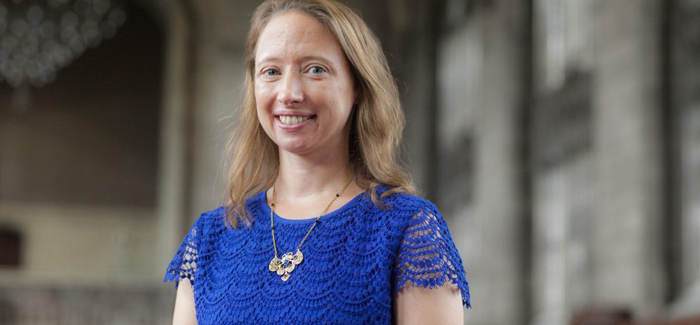
Tara Zahra. (Photography courtesy University of Chicago News Office)
MacArthur Fellows illuminate history and pursue justice, Lear is named to lead the Neubauer Collegium, the Rubenstein Forum will become a collaborative hub, high-tech tools await a new library director, a new initiative trains civic leaders, and more.
Creative minds
UChicago historian Tara Zahra and criminal justice advocate Jonathan Rapping, AB’88, were among 21 recipients of 2014 MacArthur Fellowships. Zahra, a historian of Central and Eastern Europe, was recognized for “challenging the way we view the development of the concepts of nation, family, and ethnicity and painting a more integrative picture of 20th-century European history.” Rapping, an Atlanta lawyer and founder of the legal defense nonprofit Gideon’s Promise, told the Atlanta Journal Constitution that “public defenders are doing this generation’s civil rights work.”
Direction of thought
Philosopher Jonathan Lear has been appointed the Roman Family Director of the Neubauer Collegium for Culture and Society. Lear, the John U. Nef Distinguished Service Professor in the Committee on Social Thought, Philosophy, and the College, succeeds social sciences dean David Nirenberg, the Collegium’s founding director since 2012. To date the Collegium’s research collaborations between scholars from across the University and around the world have included faculty from every department in the Divisions of the Humanities and the Social Sciences.
Obama library bid advances
A collaborative effort led by the University of Chicago to bring the Obama Presidential Library to the city’s South Side has been chosen as one of four finalists by the Barack Obama Foundation. The other finalists are the University of Illinois at Chicago, Columbia University, and the University of Hawaii. The foundation’s board expects to make a recommendation to the president and first lady in early 2015. UChicago’s proposal, made in partnership with the City of Chicago and local civic leaders, advocates locating the library in a neighborhood surrounding the University to add to the South Side’s economic and cultural development.
Forum for collaboration
A new facility to host academic conferences, meetings, ceremonies, and other campus gatherings will be named in recognition of a gift from University trustee David M. Rubenstein, JD’73. The Rubenstein Forum will be a hub for activities such as lectures and workshops featuring members of the University community, alumni, visiting scholars, and guests. The process of choosing an architect begins this fall. Scheduled to open in 2018, the new building will be located along 60th Street between Woodlawn and Kimbark Avenues overlooking the Midway Plaisance.
Library search results
Brenda L. Johnson will begin a five-year term as library director and University librarian on January 1. The Ruth Lilly Dean of University Libraries at Indiana University Bloomington since 2010, Johnson succeeds Judith Nadler, who retired in June after nearly five decades at UChicago. Previously holding leadership positions at the University of Michigan and the University of California, Santa Barbara, Johnson serves on the board of directors of the Kuali Open Library Environment (OLE), which the University Libraries implemented this fall. Kuali OLE provides technical infrastructure to support the library’s new catalog, VuFind, offering electronic access to some journals and books and displaying current availability in search results.
Heads in the cloud
The University’s Computation Institute leads a group of institutions that received $10 million from the National Science Foundation to study ways to maximize the potential of cloud computing. Because private companies such as Amazon, Google, and Microsoft host much of today’s cloud computing, information that would be useful to help researchers measure and improve the technology is unavailable. The NSF-funded project, called Chameleon for its customizable capacity, will study hardware and software through an experimental data center to help advance the cloud’s capabilities.
Lessons in leadership
Urban nonprofits and government institutions often have limited time and money to train prospective leaders. The Office of Civic Engagement, in partnership with the Civic Consulting Alliance and the Local Initiatives Support Corporation, has established the Civic Leadership Academy at the University of Chicago to help alleviate that problem. Beginning in January, fellows nominated by their organizations will take courses led by faculty from Chicago Harris, the School of Social Service Administration, Chicago Booth, the Law School, and the Graham School. After the six-month program, fellows will complete a capstone project that applies knowledge from the courses to challenges they face within their organizations.
Negotiations suspended
In September the University suspended negotiations for a second term with the Confucius Institute, a partnership begun in 2009 to foster research on China and collaborations with academic institutions there. Administrators chose not to extend the relationship, which concludes at the end of this academic year, while reiterating the University’s commitment to collaborations with Chinese scholars, students, and institutions. Funded by the Chinese government, the US campus institutes promote the teaching of the country’s language and culture, but the government’s role has raised concerns about its influence over content. More than 100 faculty members signed a petition this past spring calling for the University to end the relationship.
